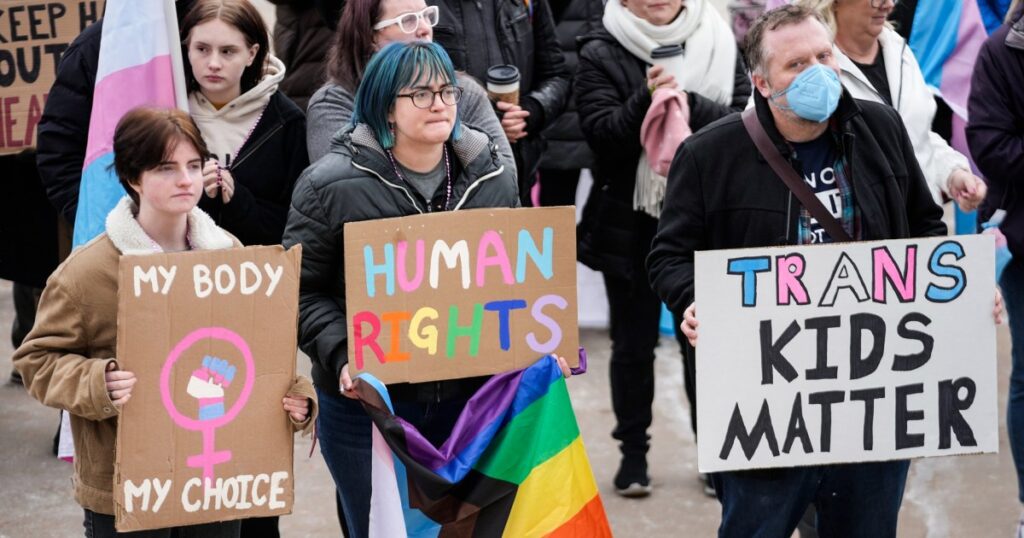Utah’s Controversial Legislation on Gender-Affirming Care: New Findings Prompt Reconsideration
Salt Lake City – In 2023, Utah lawmakers enacted a ban on gender-affirming medical treatments for minors, citing concerns over potential long-term harm and the need to protect vulnerable youth from irreversible procedures. The legislation aimed to prevent young people from making life-altering decisions based on insufficient scientific evidence, emphasizing the importance of safeguarding their future health.
Emerging Evidence Challenges the Justification for the Ban
However, recent findings from an independent investigation commissioned under the same legislation tell a different story. The study, conducted by Utah’s Department of Health and Human Services alongside leading health organizations, analyzed data from hundreds of transgender individuals and revealed that gender-affirming treatments, including hormone therapy, are associated with significant improvements in mental health and social functioning.
The report explicitly states that restricting access to hormone treatments for minors cannot be justified solely based on scientific uncertainty or fears of future regret. Instead, it underscores the positive impact these therapies have on reducing psychological distress among transgender youth.
While the department has not yet committed to lifting the statewide ban, it reminded legislators that the original intent was for the prohibition to be temporary, pending further research conducted by the state itself. This acknowledgment signals a potential shift in policy as new evidence emerges.
Legal Landscape and Political Reactions
Utah is among 27 states that have implemented laws restricting or banning gender-affirming healthcare for minors, a move that has become a focal point in national political debates. Courts in states like Arkansas, Florida, and Montana have struck down similar bans as unconstitutional, though some rulings are still under appeal. Kansas’s legislation remains unenforced at this time.
Within Utah, opinions vary among Republican officials. Some have expressed openness to considering the new data, while others remain steadfast in their opposition. A joint statement from the House sponsor of the 2023 ban and the interim health committee chair reaffirmed their intention to maintain the moratorium, citing concerns about the adequacy of current scientific evidence.
“Young individuals should not be making irreversible medical decisions based on incomplete or weak evidence,” stated Republican Representatives Katy Hall and Bridger Bolinder. “The science is not conclusive, the risks are tangible, and public opinion aligns with our cautious approach.”
Medical Consensus and Public Opinion
Despite political disagreements, the majority of major medical organizations in the United States endorse gender-affirming care as safe, effective, and essential for the well-being of transgender youth. Nevertheless, recent polls indicate that restrictions on access to such treatments resonate strongly with voters, especially among conservative constituents, highlighting the ongoing cultural divide.
Senate President Stuart Adams has indicated a willingness to review the new findings thoroughly. Previously, he expressed concerns that minors might be too young to consent to these complex treatments, emphasizing the importance of cautious evaluation.
Typically, transgender youth seeking care are first offered counseling, with some prescribed puberty blockers or hormones. Surgical interventions, such as chest or genital surgeries, are rarely performed on minors and are generally reserved for adults.
“The safety and future of our children are our top priorities,” Adams remarked. “Utah’s law was designed to protect minors while allowing time for comprehensive review of emerging medical practices, especially those involving irreversible procedures. We appreciate the efforts of the Utah Department of Health and Human Services in assessing the current evidence.”
Calls for Extended Review and Ongoing Debate
Democratic leaders, including Rep. Angela Romero and Sen. Luz Escamilla, are urging their Republican colleagues to delay final decisions until a more extensive review of the over 1,000-page report is completed. They argue that a thorough examination is necessary to ensure policies are grounded in robust scientific understanding.
Under the current law, minors diagnosed with gender dysphoria before January 2023 are permitted to continue receiving hormone treatments. However, the University of Utah recently shut down its LGBTQ+ youth health clinic following the legislation’s restrictions, which significantly reduced its patient intake. Medical professionals providing gender-affirming care risk losing licenses or facing criminal charges if they violate the ban.
The report acknowledges certain risks associated with gender-affirming treatments, such as an increased incidence of benign brain tumors in some cases. Nonetheless, experts emphasize the therapies’ crucial role in decreasing suicide risk among transgender youth.
“Data shows that individuals who received gender-affirming care before age 18 had a lower rate of suicidal ideation compared to those who sought such care as adults,” the report states. “Without access to appropriate treatment, youth with gender dysphoria are at heightened risk of psychological and social harm.”
Contrasting Federal Perspectives
This Utah report contrasts sharply with recent federal guidance issued under the administration of former President Donald Trump, which questioned the standards established by the World Professional Association for Transgender Health (WPATH). The document, released earlier this month, advocates for increased reliance on behavioral therapy over medical interventions for minors experiencing gender incongruence.
U.S. Health Secretary Robert F. Kennedy Jr. did not disclose the authorship of the federal report, and leading medical groups have criticized it for lacking consultation with established clinical experts. The Trump-era guidance also emphasizes caution, suggesting that gender transition procedures should be limited for individuals under 19, echoing previous executive orders aimed at restricting access to gender-affirming treatments for minors.

